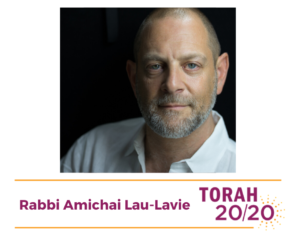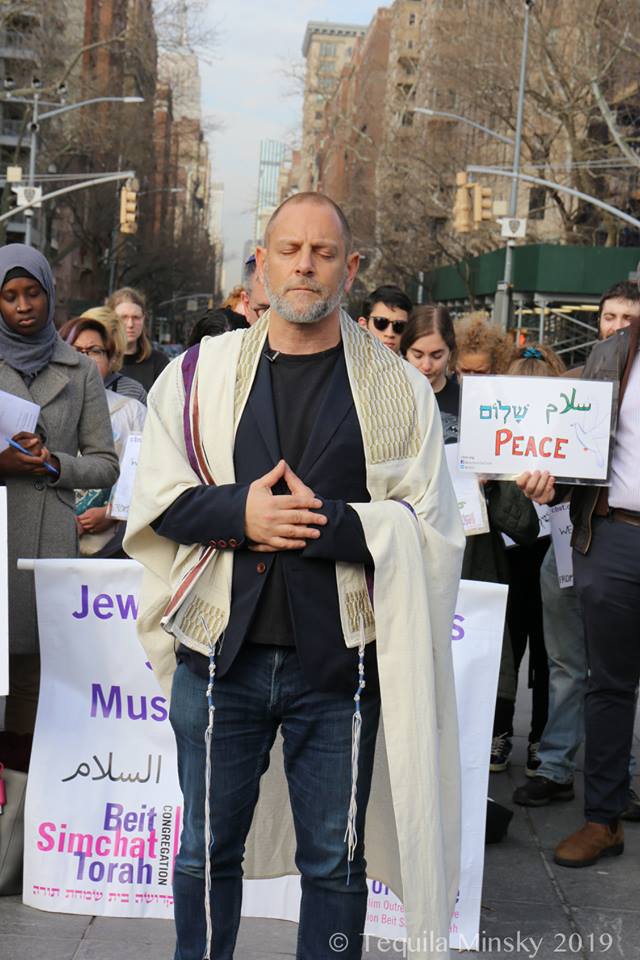A d’var Torah for Parshat Vayikra by Rabbi Amichai Lau-Lavie.
“Worthy is the generation whose leader brings a sacrifice for personal transgression and guilt.” (Midrash Sifra Vayikra 5:1)
Everybody hurts. And all of us mess up sometimes. Including leaders.
How do we, ordinary people, as well as our respective leaders, find meaningful ways to make amends for our wrongdoings, both privately and with appropriate effective public gestures of remorse and resolve to repair?
Not asking for a friend.
I recently committed a hurtful transgression by misgendering a beloved community member during an important public ritual. My use of the wrong pronoun, in rabbinic leadership capacity, caused great pain for them and their family. With my best intentions, I really messed up.
The Talmud teaches that when one hurts another with words it is literally as though one has spilled blood.
Sincere apologies were made, in writing and in person; deep conversations began and continue, making sure that all of us on my team commit to 100% awareness and presence for all and everyone in our community, to do all that we can to prevent hurts and errors in the future, to grow from this for better. I gave a personal donation in their honor to an appropriate organization. The dialogue of reconciliation continues, patiently.
It does not feel enough and the hurt still lingers.
Sign up to receive Torah 20/20 in your inbox each week.
What sort of gesture might offer an appropriate response to blame and shame, while expressing remorse and commitment to repair? The question echoes off the walls of my own heart to what is going on in hallowed and not-so-hallowed halls of power, all over the world.
Exploring options, I turned to Vayikra — Leviticus, what I think of as the Book of Blood — which is all about the no-longer-practiced art of public sacrificial gestures.
The multi-purpose sacrificial offerings, precise and potent, were used religiously by our ancestors as by most of the ancient world for thousands of years. Eventually this mix of public ritual spectacle, spiritual worship, and communal consumption of meat and produce evolved into the way we gather in religious contexts, inside sanctuaries and around our dining room altars, in courtrooms and press conferences. We found new ways to mark our gratitude and guilt, to pray for peace and confess our shortcomings.
I don’t yearn for those old days and ways of connection to the sacred, but I wonder about what we lost when we stopped ritualizing our lives with public affirmations of responsibility. Bloody, barbaric, and perhaps too primitive to our modern sensitivities as those rites may have been, they also offered a powerful way for every single one of us to be accountable.
The system, outlined in the first chapters of Leviticus, included a surprising democratic principle. Everyone has a way out of shame and a means by which to publicly atone — from the lowest member of society to those at the very top.
Chapter four describes the types of guilt offerings that will be brought by the various leaders: the anointed priests, the tribal leaders, the simple folks. When it comes to the guilt of the Nasi — the president, or local ruler, or leader — the Torah assumed that this will happen and does not say “if” but rather “when”:
“When a leader is guilty of unwittingly transgressing the laws and realizes their guilt.” (Leviticus 4:22)
Rabban Yochanan Ben Zakkai, the 1st century CE Jewish leader who saw the last days of the Jerusalem Temple and its demise, also read these words of Torah and added his comments, still so apt today:
“Worthy is the generation whose leaders actually step up to confess their unintentional as well as intentional transgressions. If this is concerning the leader, how much more so for each one of us.” (Midrash Sifra Vaiykra 5:1)
The sacrificial system was based on principles of substitution: blood for blood. Bulls and sheep and doves stood in for our own imperfect actions. Spilled blood reminded all those present that we are merely mortal, fragile, and that we too will one day end up like this, limbs exposed, eyes glazed and gone. There must have been great power in this magic of a life for a life, with words muttered, meaning mattered, life’s important moments marked with the animal’s last breath; the relief of the survivors, standing there, hands soaked in blood. Everybody had this ancient brutal way to deal, and heal, come clean and start again.
But the sacrifices didn’t last. Many of the prophets railed against the sacrificial system, blasting the religious-industrial bureaucratic complex that gave people blood and pomp instead of lives of love and justice.
“When I took your ancestors out of Egypt I did not instruct them to offer sacrifices!’ (Jer. 7:22)
Jeremiah railed in Jerusalem in one of his early rants, speaking for the God of Israel. Eventually, his vision won. The old system crumbled and sacrifices became metaphors. We evolved and are left with words or prayer instead of bulls and blood.
And though we may be missing the visceral, words are what we have to work with. And words can matter much. Two months ago the Merriam-Webster Dictionary published their word of the year for 2019. The word is THEY — as in the pronoun.
That’s how important this new reality is for so many of us. This is the power of words to change consciousness. Words can hurt so much — and words can, and must, also heal.
Find more commentaries on Parshat Vayikra.
It is a word that failed me here and I hope that the sincerity of words — spoken, written — are those that will help heal. My words, both privately and here, in public, to express remorse, regret, and every wish I have for the ability to gain forgiveness and repair relationships and trust. I hope that by exposing this transgression others will be led to learn, to be more careful, to pause, and respect the choices of identities and pronouns, the delicate demands for dignity in every way we are called upon.
Everybody hurts. So many are hurting. Can our ancient wisdom teach us how to heal? We can perhaps learn from our past how to process transgressions, and how to adapt ancient tools to use in our private and public pursuit of forgiveness.
I hope that we and those we raise and teach can be among the generations worthy of brave and honest leaders. And that each of us takes the lead by doing our best to walk our talk, with each step closer to the promised lands of our sacred yearnings and a better balanced world to live in and to leave beyond.
Rabbi Amichai Lau-Lavie is the Founding Spiritual Leader of Lab/Shul NYC and the creator of Storahtelling, Inc.

